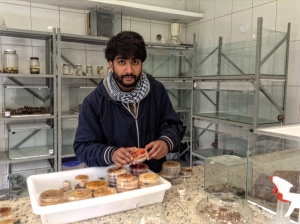
What is your favorite travel memory?
When I was 21 I visited Argentina as a volunteer. I was in my last year of university studying Politics and Economics and I went to volunteer in the hope that I would decide a career path on the trip. I went to visit Iguazu Falls on the border of Argentina and Brazil. I remember walking along the wooden path above the edge of the waterfalls. The water spray was almost enough to drown in. The sheer quantity of water that was falling below my feet made me realize that my true passion had always been nature and understanding it through the scientific method. Not only was the scene visually impressive but this trip made me decide to follow environment/biology as a career path and I haven’t regretted it a day ever since.
How have you changed/grown since working for your current company?
I have learnt so much at IPBio. I always enjoyed and read a lot about biology, however, I studied economics and politics. Since I have worked for IPBio, I have learned so much more than I ever could have only reading books. I have met bat ethologists, evolutionary biologists, bio-chemistry professors, forest engineers and the list goes on. These encounters have expanded my knowledge on topics that I never even thought I would be interested in.
What is the best story you've heard from a return student?
We had a volunteer who studied mammal diversity by camera traps on our reserve. She found a total of 14 mammal species including some incredible animals such as the oncilla (a small wild feline) and capuchin monkeys. Her project took 3 months to complete and then it was time for her to return to her home country to go back to finish her studies. She was very sad to leave as she had loved her stay so much. She left with tears on her face as she went to Sao Paulo to catch her flight. Two days later, I received an email from her informing IPBio that she loved it so much that she decided to miss her flight and come back to stay another 6 months. She is currently still working at the reserve. By far the best story I have heard from a (technically) return volunteer.
If you could go on any program that your company offers, which one would you choose and why?
I would love to take part in the Bioluminescent Mushroom program. IPBio has a partnership with the top ranked Brazilian university called USP where we study the ecology and chemistry of these mushrooms. IPBio is located in the region with the highest concentration of bioluminescent mushrooms in the world. In the summer, when the humid conditions are favorable to their growth, the floor of the forest is glowing green, like Avatar, by these mushrooms. The program is focused on cultivating mushrooms in the lab. As the mushrooms only grow in the summer, IPBio currently can’t have researcher, tourism or education programs related to the mushrooms in the off seasons. However, if we can grow the in controlled conditions then it opens a range of possibilities. Not to mention, the intrinsic value of learning how to grow them in controlled conditions. I find this program very exciting as it is also believed that many more new species of bioluminescent mushrooms will be found with further research.
What makes your company unique? When were you especially proud of your team?
I believe what makes IPBio unique is its approach to research by combining it with photography. We believe that biodiversity research, and all its wonders, has become so detached from the general public and has stifled conservation. Our institutes’ vision is to bridge this gap. We have done this by ensuring that all of our research programs can be photographed or filmed and that this footage can be used to raise awareness about conservation. Our biologists are all trained with a camera and that means we produce large quantities of footage that is used in documentaries, education programs or other mediums to connect with the lay public so they not only see the wonderful wildlife out there but how field research is conducted.